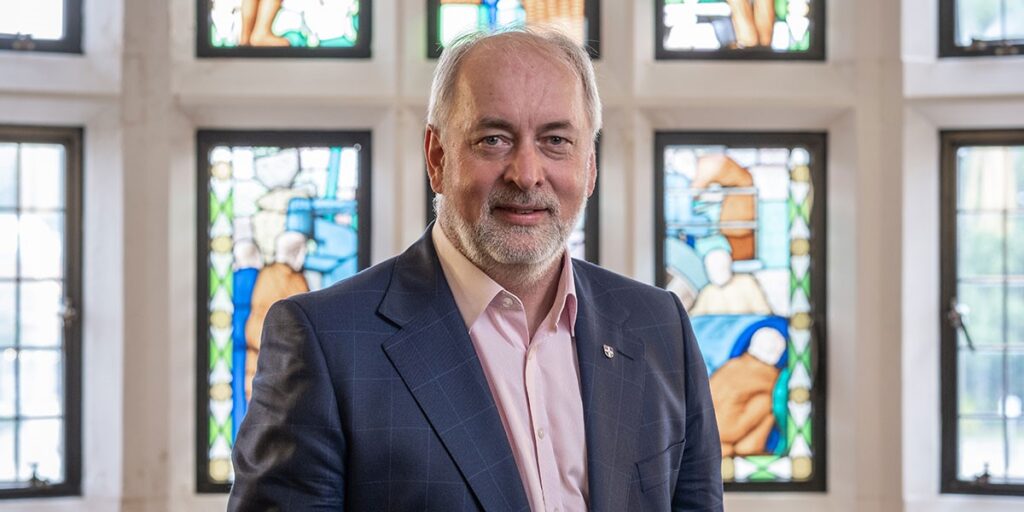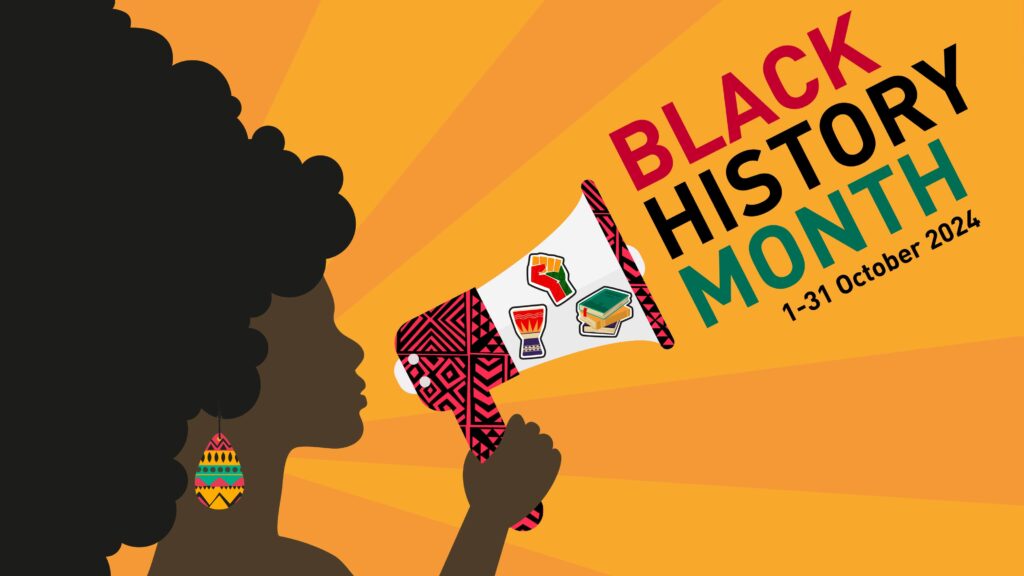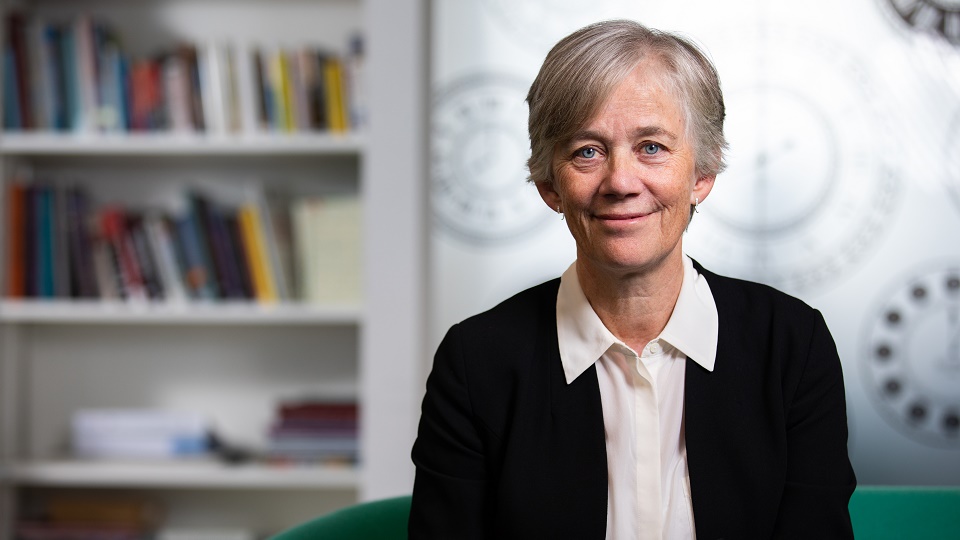From the Vice-Chancellor – October 2024

In my October newsletter: Celebrating our athletes’ achievements at the Paris Games, a successful Aftrak trial, marking Black History Month, the first symposium for the UK SCALE Centre, engaging with the political agenda, and Dame Angela McLean’s public lecture.
Event celebrates Loughborough’s sporting success at Paris 2024
This month we held an event at The Kia Oval in London to celebrate the success of Loughborough’s athletes at the Paris 2024 Olympic and Paralympic Games.
Hosted by alumnus, University Council member and Sky Sports News presenter Mike Wedderburn, the evening brought together athletes, coaches, support staff, researchers, sporting partners and University staff to celebrate Loughborough’s enviable success in Paris, with our athletes bringing home an incredible 35 medals across both games.
The celebration event included panel discussions hosted by alumnus and University Chancellor Lord Sebastian Coe. Medal-winning athletes Daniel Wiffen, Tully Kearney MBE, Alex Haydock-Wilson and Charlie Dobson discussed how they have cultivated performance mindsets and worked with their teams at Loughborough to deliver truly world-class performances. Our coaching teams and leaders from UK Athletics and Paralympics GB shared how they have built outstanding performance support teams over Olympic and Paralympic cycles. Our video provides a summary of the evening.
I am incredibly proud of the world-class ecosystem at Loughborough, which underpins these successes and recognises the transformative power of sport. Our inclusive approach is also reflected in our landmark partnership with ParalympicsGB announced earlier this month. By working together ParalympicsGB and Loughborough will support our world class athletes, and inspire and empower individuals of all abilities to participate in sport.
Our newly-launched Para and Disability Sport Strategy similarly has opportunity at its core – opportunity for disabled students to be active in the way they want, opportunity to become a coach or official, or the opportunity to strive for glory at the Paralympic Games.
One of our strategic aims is to excel in sport and use our pre-eminence to create new opportunities; I think we’re making huge strides in doing just that.
First phase Aftrak trial proves successful
When undertaking research, we often strive for it to have an impact on society. Sometimes this takes time, and sometimes it’s more immediately evident, as with the Loughborough-led Aftrak project, which this year won the international, $1million Milken Motsepe Prize in Green Energy.
Aftrak combines solar microgrids and tailored tractors to empower smallholder farmers, with the aim of significantly increasing crop yields and incomes and providing rural communities with access to clean, green electricity; currently 89% of the population in Malawi lives without access to electricity.
Over the summer a team that included academics from Loughborough went to Malawi to implement the first phase of Aftrak’s integration within local communities. They built a solar farm with eight panels that is sufficient to provide electricity to the village and also set up a small solar farm as a demonstrator at the headquarters of Tiyeni, a Malawian non-governmental organisation. Our video shows the team’s work.
Following the success of the initial trial, the team is now looking to carry out a further field trial that will run for up to two years. Ultimately their aim is to roll the project out throughout Malawi and into neighbouring countries such as Zambia, Zimbabwe and Botswana.
Aftrak is currently raising investment to deploy its innovative technology across Malawi and aims to contribute to World Bank goals of providing electricity to 380 million people in Africa by 2030.
Projects such as this are hugely strategically important. Aftrak involves a partnership of researchers from the University’s Centre for Renewable Energy Systems Technology, Tiyeni, and the Consortium for Battery Innovation. It has been supported by Innovate UK, and one of the world’s largest battery manufacturers, Varta by Clarios. It also shows how cutting edge research and innovation can bring tangible international engagement and impact, in line with our Climate Change and Net Zero theme.

Events mark Black History Month
Throughout October we have been marking Black History Month with a series of events and workshops themed around ‘Reclaiming the Narrative’, which encourages us to challenge the dominant voice, correct historical inaccuracies, tell untold stories and honour those who have been overlooked.
There have been a number of engaging events over the course of the month, including the annual Black History Month March that took place yesterday. There’s still time to catch the final event in the series; next month’s Presidential election in the US could see Kamala Harris, the first woman of African and South Asian descent, elected to hold the most powerful office in the world – on 5 November, a panel will gather to discuss what this could mean for women worldwide.
Although Black History Month takes place in October, it’s important that we shine a light on Black histories, cultures and identities all year round. You can find out more about the race equity work taking place at Loughborough on our Black History Month webpage, including toolkits and resources to support your work and discussions with colleagues.
I know that this year has been particularly distressing for many within our community, with ongoing conflict impacting so many people around the world, and violence in the UK, such as this summer’s race and Islamophobic rioting and the rise in anti-Semitic and Islamophobic incidents.
In light of this, next month the EDI team will hold a Peace Assembly, to bring together staff and students in solidarity for peace. The Assembly will be a space for expression through respectful discussion, creative and performing arts and quiet reflection. The aim is for the Peace Assembly to be a forerunner to community members coming together to form a Loughborough University Peace Alliance, supporting further community events to be held in the future.
I hope you will consider attending the Assembly and joining the Peace Alliance.
First symposium hosted by new UK SCALE Centre
This month we held the first symposium hosted by the UK Supply Chain and Logistics Excellence (SCALE) Centre, which was launched this summer and is part of the prestigious MIT Global SCALE Network.
The centres in the MIT network bring together industry and academia to pool their expertise and collaborate on research projects that address real-world supply chain and logistics challenges, helping companies worldwide navigate an increasingly complex business environment.
The symposium allowed partners from industry, policy and academia to share their vision, drive and ambition that will help to shape the future of supply chain management and logistics and accelerate the nation’s economic growth – a key strand of government policy.
This month we held the first symposium hosted by the UK Supply Chain and Logistics Excellence (SCALE) Centre, which was launched this summer and is part of the prestigious MIT Global SCALE Network.
The centres in the MIT network bring together industry and academia to pool their expertise and collaborate on research projects that address real-world supply chain and logistics challenges, helping companies worldwide navigate an increasingly complex business environment.
The symposium allowed partners from industry, policy and academia to share their vision, drive and ambition that will help to shape the future of supply chain management and logistics and accelerate the nation’s economic growth – a key strand of government policy.
By working collaboratively across sectors through the UK SCALE Centre, we can deliver transformational impact. For example, we will be able to maximise advanced digital technologies to better track the movement of goods, enabling businesses to become more agile in meeting shifts in customer demands. And we will be able to accelerate the application of the circular economy to work towards a more sustainable future for everyone.
We have worked with Massachusetts Institute of Technology (MIT) – the world’s top-rated university in the global QS rankings – for many years, particularly on engineering collaborations and now on supply chain and logistics management. Intensifying and expanding strong partnerships such as these are the cornerstone of our strategic Partnerships core plan.
Engagement aims to help shape political discussions
Every autumn, UK political parties hold their annual conferences, bringing together politicians, party members and affiliated groups. The conferences offer opportunities for us to engage with key political voices on issues that are important to both Loughborough and the higher education sector.
Staff from the University attended both the Labour and Conservative Party Conferences again this year.
At the Labour Party Conference, we held a fringe meeting on the role hydrogen can play in meeting net zero targets. Professor Dan Parsons, Pro Vice-Chancellor for Research and Innovation, Loughborough MP Dr Jeevun Sandher (who is also chair of the All-Party Parliamentary Group on Hydrogen) and representatives from the trade body Hydrogen UK and the gas network company Cadent sat on a discussion panel with a very engaged audience. Opportunities such as these are important progressions in our ambitions for the for The Hydrogen Works – a strategic consortium led by Loughborough to drive skills, innovation and productivity to create a hydrogen superpower in the East Midlands.
Alongside the Labour conference we took part in an event to showcase activity and regional strengths in creative technology R&D and innovation. The event was hosted by the CoSTAR Foresight Lab (a collaboration that includes Loughborough and focuses on the knowledge, trends and needs of the creative industries) and Liverpool City Region Combined Authority.
Alongside the Labour conference we took part in an event to showcase activity and regional strengths in creative technology R&D and innovation. The event was hosted by the CoSTAR Foresight Lab (a collaboration that includes Loughborough and focuses on the knowledge, trends and needs of the creative industries) and Liverpool City Region Combined Authority.
Following on from the party conferences we launched our Living Well Inquiry, which looks at what it takes for people and communities to live well in mid-21st Century Britain. The Inquiry is being led by Dr Holly Collison-Randall and Professor Mark Monaghan, who are Co-Fellows in the Policy Unit.
The University is well-placed to shape the ‘living well’ agenda, with expertise across a broad range of relevant areas. Following initial engagement with the University’s research community, the Inquiry has published a White Paper, which defines ‘living well’, looks at how other nations measure and shape policy on wellbeing and poses questions for further consultation on five themes: Clean Living, Creative Living, Dignified Living, Healthy Living and Smart Living.
The inquiry team is now undertaking a programme of external engagement with government departments, think tanks and advisors, as well as organisations and charities whose work contributes to the ‘living well’ themes. If you would like to contribute to the Inquiry you can still do so through the website.

Honorary Distinguished Professor gives public lecture
In July this year we appointed Dame Angela McLean, the Government Chief Scientific Adviser (GCSA), as an Honorary Distinguished Professor at the University, and I was delighted to welcome her to campus this month for her first official engagement in that capacity.
In her role as GCSA Dame Angela is responsible for providing scientific advice to the Prime Minister and members of cabinet, advising the government on aspects of policy on science and technology, and ensuring and improving the quality and use of scientific evidence and advice in government. She is the first woman to hold the role.
In her lecture this month to staff, students and members of the public, Dame Angela set out her priorities for ensuring that science advice is central to decision making. She talked about the importance of knowing the right person to ask and what to ask them and outlined the science challenges of today and the future. In the face of ever-evolving global challenges, such as political instability, global pandemics or cost-of-living crises, ensuring that robust, evidence-based and high-quality scientific advice can inform government choices and policies is vital.
Whilst she was at the University, we were able to show Dame Angela some of our facilities, including the National Centre for Sport and Exercise Medicine (NCSEM), the Peter Harrison Centre for Disability Sport and the National Rehabilitation Centre that are all playing a crucial role in driving forward knowledge and innovation in health sciences.
Vice-Chancellor's Communications
Opinions and comment from the Vice-Chancellor, Professor Nick Jennings

